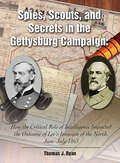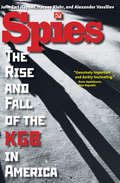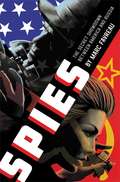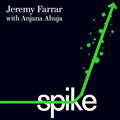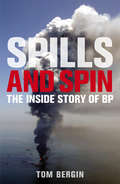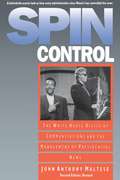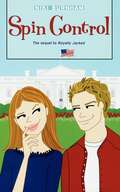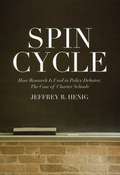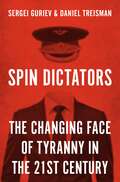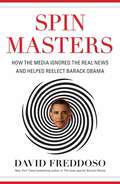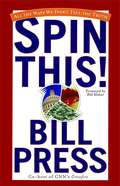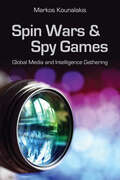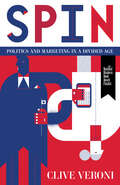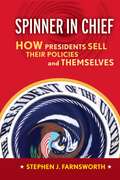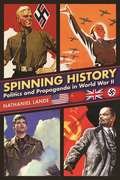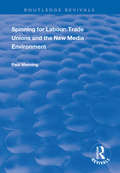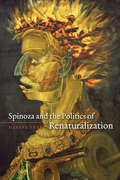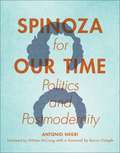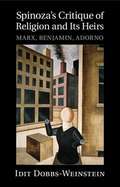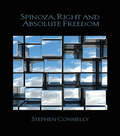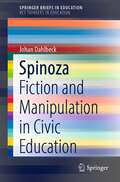- Table View
- List View
Spies, Scouts, and Secrets in the Gettysburg Campaign: How the Critical Role of Intelligence Impacted the Outcome of Lee's Invasion of the North, June–July 1863
by Thomas J. Ryan&“A fascinating book, and the most detailed account you will find about intelligence operations during the Gettysburg campaign.&” —Dr. Vince Houghton, Historian/Curator, International Spy Museum, Washington, DC As intelligence experts have long asserted, &“Information in regard to the enemy is the indispensable basis of all military plans.&” Despite the thousands of books and articles written about Gettysburg, Tom Ryan&’s groundbreaking Spies, Scouts, and Secrets in the Gettysburg Campaign is the first to offer a unique and incisive comparative study of intelligence operations during what many consider the war&’s decisive campaign. Based upon years of indefatigable research, the author evaluates how Gen. Robert E. Lee used intelligence resources, including cavalry, civilians, newspapers, and spies to gather information about Union activities during his invasion of the North in June and July 1863, and how this information guided Lee&’s decision-making. Simultaneously, Ryan explores the effectiveness of the Union Army of the Potomac&’s intelligence and counterintelligence operations. Both Maj. Gens. Joe Hooker and George G. Meade relied upon cavalry, the Signal Corps, and an intelligence staff known as the Bureau of Military Information that employed innovative concepts to gather, collate, and report vital information from a variety of sources.
Spies: The Rise and Fall of the KGB in America
by John Earl Haynes Harvey Klehr Alexander Vassiliev&“This important new book . . . based on archival material . . . shows the huge extent of Soviet espionage activity in the United States during the 20th century&” (The Telegraph). Based on KGB archives that have never been previously released, this stunning book provides the most complete account of Soviet espionage in America ever written. In 1993, former KGB officer Alexander Vassiliev was permitted unique access to Stalin-era records of Soviet intelligence operations against the United States. Years later, Vassiliev retrieved his extensive notebooks of transcribed documents from Moscow. With these notebooks, John Earl Haynes and Harvey Klehr have meticulously constructed a new and shocking historical account. Along with valuable insight into Soviet espionage tactics and the motives of Americans who spied for Stalin, Spies resolves many long-standing intelligence controversies. The book confirms that Alger Hiss cooperated with the Soviets over a period of years, that journalist I. F. Stone worked on behalf of the KGB in the 1930s, and that Robert Oppenheimer was never recruited by Soviet intelligence. Uncovering numerous American spies who never came under suspicion, this essential volume also reveals the identities of the last unidentified American nuclear spies. And in a gripping introduction, Vassiliev tells the story of his notebooks and his own extraordinary life.
Spies: The Secret Showdown Between America and Russia
by Marc FavreauA thrilling account of the Cold War spies and spycraft that changed the course of history, perfect for readers of Bomb and The Boys Who Challenged Hitler.The Cold War spanned five decades as America and the USSR engaged in a battle of ideologies with global ramifications. Over the course of the war, with the threat of mutually assured nuclear destruction looming, billions of dollars and tens of thousands of lives were devoted to the art and practice of spying, ensuring that the world would never be the same.Rife with intrigue and filled with fascinating historical figures whose actions shine light on both the past and present, this timely work of narrative nonfiction explores the turbulence of the Cold War through the lens of the men and women who waged it behind closed doors, and helps explain the role secret and clandestine operations have played in America's history and its national security.
Spike: The Virus vs. The People - the Inside Story
by Anjana Ahuja Jeremy Farrar***THE TOP 5 SUNDAY TIMES BESTSELLER***A pulse-racing journey through the science and politics of the pandemic. Did the UK government really 'follow the science' throughout the Covid-19 pandemic, as it claims?The Coronavirus pandemic has devastated lives and livelihoods around the world - and continues to do so. These personal tragedies will, and must, be told and heard. There is, however, also a truthful and objective scientific narrative to be written about how the virus played out and how the world set about dealing with it. Spike is that story -from the inside. Its author, Jeremy Farrar, is one of the UK's leading scientists and a - member of the SAGE emergency committee.As head of the Wellcome Trust, and an expert in emerging infectious diseases, Jeremy Farrar was one of the first people in the world to hear about a mysterious new respiratory disease in China - and to learn that it could readily spread between people. Farrar describes how it feels as one of the key scientists at the sharp end of a fastmoving situation, when complex decisions must be made quickly amid great uncertainty. His book casts light on the UK government's claims to be 'following the science' in its response to the virus, and is informed not just by Farrar's views but by interviews with other top scientists and political figures.Farrar, who has spent his career on the frontlines of epidemics including Nipah virus in Malaysia, bird flu in Vietnam and Ebola in West Africa, also reflects on the wider issues of Covid-19: the breath-taking scientific advances in creating tests, treatments and vaccines; the challenge to world leaders to respond for the global good and the need to address inequalities that hold back success against the virus. All these shape how the world ultimately fares not just against Covid-19, but against all the major health challenges we face globally.
Spillover Effects and the East African Community
by Paulo Drummond Gustavo RamirezThe East African Community (EAC) countries--Kenya, Tanzania, Uganda, and Rwanda--have been affected by the global financial crisis and global recession. the fall in global demand and inflows and tighter liquidity conditions abroad affected the countries in this region as elsewhere in sub-Saharan Africa. But how hard have countries in the EAC been hit? Have the spillovers from the global crisis affected countries in the region as much as other countries in the sub-Saharan region? Have the transmission channels or magnitudes of the spillovers been different across EAC countries? How can these countries return quickly to a path of sustained high growth? What is the role for policy? Would acceleration of regional integration and policy coordination help achieve this goal? Would it make the region less susceptible to shocks? This paper focus on the EAC countries and attempts to address these questions.
Spillovers of Domestic Shocks: Will They Counteract the "Great Moderation"?
by Ashoka Mody Alina CarareA report from the International Monetary Fund.
Spills and Spin: The Inside Story of BP
by Tom BerginIn April 2010, the world watched in alarm as BP's Macondo well suffered a fatal explosion and a catastrophic leak. Over the next three months, amid tense scenes of corporate and political finger-pointing, millions of barrels of crude oil dispersed across the Gulf of Mexico in what became one of the worst oil spills in history.But there is more to BP's story than this. Tom Bergin, an oil broker turned Reuters reporter, watched the 'two-pipeline company' of the early 1980s grow into a dynamic oil giant and PR machine by the turn of the twenty-first century. His unique access to key figures before, during and after the spill - including former CEO Tony Hayward - has enabled him to piece together this compelling account of a corporation in crisis, and to examine how crucial decisions made during BP's remarkable turnaround paved the way for its darkest hour.
Spin Control
by John Anthony MalteseSpin Control, originally published in 1992, chronicles the development of the powerful White House Office of Communications and its pivotal role in molding our perception of the modern presidency. In this new edition, John Maltese brings his analysis up to date with a chapter detailing the media techniques of the Bush administration, the 1992 presidential campaign (including the use of talk shows like 'Larry King Live'), and the early Clinton administration.
Spin Control
by Niki BurnhamValerie Winslow never thought life in the tiny country of Schwerinborg could be so great. But then she never thought she would be dating the prince of Schwerinborg either! Georg, a real prince, is also her first real boyfriend. And then everything falls apart. Georg's decided they need to cool off for a while and her dad's sending her back to Virginia to visit her mom. Valerie's bummed -- until she decides to go out with her old crush, David Anderson. David may not be a prince, but maybe he'll take her mind off of Georg -- or will he?
Spin Cycle: How Research Gets Used in Policy Debates--The Case of Charter Schools
by Jeffrey R. HenigOne important aim of social science research is to provide unbiased information that can help guide public policies. However, social science is often construed as politics by other means. Nowhere is the polarized nature of social science research more visible than in the heated debate over charter schools. In Spin Cycle, noted political scientist and education expert Jeffrey Henig explores how controversies over the charter school movement illustrate the use and misuse of research in policy debates. Henig’s compelling narrative reveals that, despite all of the political maneuvering on the public stage, research on school choice has gradually converged on a number of widely accepted findings. This quiet consensus shows how solid research can supersede partisan cleavages and sensationalized media headlines. In Spin Cycle, Henig draws on extensive interviews with researchers, journalists, and funding agencies on both sides of the debate, as well as data on federal and foundation grants and a close analysis of media coverage, to explore how social science research is “spun” in the public sphere. Henig looks at the consequences of a highly controversial New York Times article that cited evidence of poor test performance among charter school students. The front-page story, based on research findings released by the American Federation of Teachers (AFT), sparked an explosive debate over the effectiveness of charter schools. In the ensuing drama, reputable scholars from both ends of the political spectrum launched charges and counter-charges over the research methodology and the implications of the data. Henig uses this political tug-of-war to illustrate broader problems relating to social science: of what relevance is supposedly non-partisan research when findings are wielded as political weapons on both sides of the debate? In the case of charter schools, Henig shows that despite the political posturing in public forums, many researchers have since revised their stances according to accumulating new evidence and have begun to find common ground. Over time, those who favored charter schools were willing to admit that in many instances charter schools are no better than traditional schools. And many who were initially alarmed by the potentially destructive consequences of school choice admitted that their fears were overblown. The core problem, Henig concludes, has less to do with research itself than with the way it is often sensationalized or misrepresented in public discourse. Despite considerable frustration over the politicization of research, until now there has been no systematic analysis of the problem. Spin Cycle provides an engaging narrative and instructive guide with far-reaching implications for the way research is presented to the public. Ultimately, Henig argues, we can do a better job of bringing research to bear on the task of social betterment.
Spin Dictators: The Changing Face of Tyranny in the 21st Century
by Daniel Treisman Sergei GurievHow a new breed of dictators holds power by manipulating information and faking democracyHitler, Stalin, and Mao ruled through violence, fear, and ideology. But in recent decades a new breed of media-savvy strongmen has been redesigning authoritarian rule for a more sophisticated, globally connected world. In place of overt, mass repression, rulers such as Vladimir Putin, Recep Tayyip Erdogan, and Viktor Orbán control their citizens by distorting information and simulating democratic procedures. Like spin doctors in democracies, they spin the news to engineer support. Uncovering this new brand of authoritarianism, Sergei Guriev and Daniel Treisman explain the rise of such “spin dictators,” describing how they emerge and operate, the new threats they pose, and how democracies should respond.Spin Dictators traces how leaders such as Singapore’s Lee Kuan Yew and Peru’s Alberto Fujimori pioneered less violent, more covert, and more effective methods of monopolizing power. They cultivated an image of competence, concealed censorship, and used democratic institutions to undermine democracy, all while increasing international engagement for financial and reputational benefits. The book reveals why most of today’s authoritarians are spin dictators—and how they differ from the remaining “fear dictators” such as Kim Jong-un and Bashar al-Assad, as well as from masters of high-tech repression like Xi Jinping.Offering incisive portraits of today’s authoritarian leaders, Spin Dictators explains some of the great political puzzles of our time—from how dictators can survive in an age of growing modernity to the disturbing convergence and mutual sympathy between dictators and populists like Donald Trump.
Spin Dictators: The Changing Face of Tyranny in the 21st Century
by Daniel Treisman Sergei GurievHow a new breed of dictators holds power by manipulating information and faking democracyHitler, Stalin, and Mao ruled through violence, fear, and ideology. But in recent decades a new breed of media-savvy strongmen has been redesigning authoritarian rule for a more sophisticated, globally connected world. In place of overt, mass repression, rulers such as Vladimir Putin, Recep Tayyip Erdogan, and Viktor Orbán control their citizens by distorting information and simulating democratic procedures. Like spin doctors in democracies, they spin the news to engineer support. Uncovering this new brand of authoritarianism, Sergei Guriev and Daniel Treisman explain the rise of such “spin dictators,” describing how they emerge and operate, the new threats they pose, and how democracies should respond.Spin Dictators traces how leaders such as Singapore’s Lee Kuan Yew and Peru’s Alberto Fujimori pioneered less violent, more covert, and more effective methods of monopolizing power. They cultivated an image of competence, concealed censorship, and used democratic institutions to undermine democracy, all while increasing international engagement for financial and reputational benefits. The book reveals why most of today’s authoritarians are spin dictators—and how they differ from the remaining “fear dictators” such as Kim Jong-un and Bashar al-Assad, as well as from masters of high-tech repression like Xi Jinping.Offering incisive portraits of today’s authoritarian leaders, Spin Dictators explains some of the great political puzzles of our time—from how dictators can survive in an age of growing modernity to the disturbing convergence and mutual sympathy between dictators and populists like Donald Trump.
Spin Masters: How the Media Ignored the Real News and Helped Reelect Barack Obama
by David FreddosoThe biggest story of the election was how the media ignored the biggest story of the election.Amid all the breathless coverage of a non-existent War on Women, there was little or no coverage of Obama's war on the economy-how, for instance, part-time work is replacing full-time work; how low-wage jobs are replacing high-wage ones; how for Americans between the ages of 25 and 54 there are fewer jobs today than there were when the recession officially ended in 2009, and fewer, in fact, than at any time since mid-1997.The downsizing of the American economy wasn't the only story the media missed-or suppressed-there was also the unraveling of Obama's foreign policy and the deadly scandals at home (Fast & Furious) and abroad (the terrorist attack that killed the American ambassador at Benghazi).But instead of serious, substantive journalism, the media reported ad nauseam on trifles (Big Bird), Republican-baiting hysteria (how everything the Republicans said was allegedly "racial code"), and distortions of Romney's remarks (such as the 47% comment). The media dropped the ball in covering the 2012 election, writes David Freddoso, editorial page editor of The Washington Examiner, and in doing so the media failed in their responsibility to keep politicians honest and the public well-informed. Freddoso, a New York Times bestselling author and former congressional reporter for National Review, fills this volume not only with outrageous examples of media bias, but also with dozens of real stories that genuinely inquisitive reporters should have relished but that the overwhelmingly liberal press didn't even bother to cover.Full of the news you didn't hear about in 2012, David Freddoso's Spin: How the Media Ignored the Real News and Helped Reelect Barack Obama will be the most provocative and accurate take of just how Barack Obama managed to get reelected amidst the worst economic times since at least the 1970s, and how the media helped him do it.
Spin This!
by Bill PressWe're all familiar with the warning, "Don't believe everything you see or hear. " Bill Press, the popular co-host of CNN's Crossfire, will have you wondering whether you should believe anything at all. Spin -- intentional manipulation of the truth -- is everywhere. It's in the White House, in the courtrooms, in headlines and advertising slogans. Even couples on dates -- not to mention book jackets -- are guilty of spin. Now, analyst Bill Press freeze-frames the culture of spin to investigate what exactly spin is, who does it and why, and its impact on American society as a whole. Depending upon who is doing it, spinning can mean anything from portraying a difficult situation in the best possible light to completely disregarding the facts with the intent of averting embarrassment or scandal. Using examples drawn from recent history -- the Clinton presidency, the Florida recount, and the Bush White House -- Press first probes spin's favorite haunt: politics. In addition to surveying the incarnations of spin in the fields of journalism, law, and advertising, Press also chews on the spin of sex and "dating," a word that has become the very embodiment of spin. Perhaps surprisingly, however, Press argues that spin isn't all bad, and that without it the harsh truths of our times might be too tough to swallow. With the same keen sense of humor that helped make CNN's Crossfire television's premier debate show and the limited run of The Spin Room so popular, Press turns the tables on the prime purveyors of spin -- called spin doctors -- noting some of their biggest guffaws and blunders. As Press notes, it has become abundantly clear that the twenty-first century, beginning as it has with a president who was "spun into office," will be a fertile stomping ground for spin.
Spin Wars and Spy Games: Global Media and Intelligence Gathering
by Markos KounalakisAs most long-standing news outlets have shuttered their foreign bureaus and print operations, the role of GNNs as information collectors and policy influencers has changed in tandem. Western GNNs are honored for being untethered to government entities and their ability to produce accurate yet critical situational analyses. However, with the emergence of non-Western GNNs and their direct relationships to the state, the independent nature of our global news cycle has been vastly manipulated. In Spin Wars and Spy Games, Kounalakis uses his interviews with an expansive and diverse set of GNN professionals to deliver a vivid depiction of the momentous sea change in mass media production. He traces the evolution of global news networks from the twentieth century to now, revealing today's drastically altered news business model that places precedence on networks leveraging global power. This eye-opening narrative transforms our understanding of why countries like Russia and China invest heavily in their news media, and how the GNN framework operates in conjunction with state strategy and diplomatic sensitivity. Profoundly meticulous and insightful, this seminal work on the current state of transnational journalism gives readers a first-hand look at how global media powers shape policy and morph the public's consumption of information.
Spin: Politics and Marketing in a Divided Age
by Clive VeroniSpin has been updated with a new introduction reflecting on the current era of Brexit and Trump.Aided by masses of data, sophisticated computer modelling, and smart manipulation of social media, political strategists are reshaping the way voters think. And act. Clive Veroni analyzes the inner workings of campaign organizations to show how they build and motivate teams, and how they approach strategic and future planning. And those strategies being used to influence our choices at the ballot box will soon be used to influence our choices in the grocery store.Spin focuses on the well-known characters from the worlds of politics and marketing to reveal how all of us will be affected by the surprising new ways in which companies and politicians will try to persuade us to vote for their brands.
Spinner in Chief: How Presidents Sell Their Policies and Themselves (Media and Power)
by Stephen J. FarnsworthAs the U.S. enters the last lap of the 2008 presidential election season, the media and the candidates are in full gear exploiting each other, often at the expense of public information and awareness. This book looks at how presidents and presidential candidates use television, the Internet, and newspapers to promote their policies and themselves, even as they are sometimes manipulated by the media they so avidly seek. Looking at White House media strategies relating to the Iraq War and occupation, health care reform, tax and budget debates, the debate over Bush's competence, the Clinton-Lewinsky sex scandal, and the early battles of the 2008 presidential election, media scholar and former journalist Stephen Farnsworth examines how presidents shift the direction and limit the amount of public debate over policies to favor themselves-and how reporters and Internet commentators often help them do so. The result short-circuits the public's role in evaluating competing visions for the country's future and the legislative branch's role in policy making. The modern presidential obsession with public relations-and media willingness to be used to advance executive power-undermine the country's long term ability to deal with crucial problems, including foreign and military relations, a growing government debt, and public health care shortcomings.
Spinning History: Politics and Propaganda in World War II
by Nathaniel LandeAn “original and insightful” look at World War II through the lens of theater, propaganda, and the most important performances in human history (Richard Cole, PhD). In this fascinating book, more relevant than ever in today’s political climate of “fake news” and “alternative facts,” bestselling author and historian Nathaniel Lande presents WWII as a drama staged and overseen by four contrasting masters: Roosevelt, Churchill, Hitler, and Stalin. Each man had his own script for elaborately produced campaigns of deception, winning hearts and minds on the frontlines and the home front. Each leader used all the tools at his disposal to promote his own narrative of the Second World War. Brilliantly conceived oratory was applied to underscore each vision. Impression management—the art of political spin—was employed to drive the message home. Each side employed uniforms, meticulously staged events, and broadcast their messages via all media available—motion pictures, radio broadcasts, songs, posters, leaflets, and beyond. The result of Lande’s exploration is “an illuminating, readable, and still very relevant account of the ways in which theatrical staging, dramatic storytelling, and message manipulation were key to the efforts of both sides during those turbulent years” (Richard Zoglin, senior editor, Time).
Spinning for Labour: Trade Unions And The New Media Environment (Routledge Revivals)
by Paul ManningFirst published in 1998, this volume asks: are groups or organisations beyond the sphere of Westminster politics doomed to be marginalised in mainstream news coverage, or can the currently fashionable emphasis upon media techniques and 'spin doctoring' offer such non-official news sources a means of securing media success?. This question is now surfacing as a major issue within politics and cultural debates, as well as within the sociology of the mass media and communication studies. We are living through a period of remarkable transformation in politics, culture and social arrangements. Communications experts in the 'new Labour' camp believe that trade unions must respond by becoming more sophisticated in their use of the media and marketing techniques; and by employing new vocabularies for communicating their messages to the public. However, can trade unions succeed in using the tricks of the 1990s spin doctor to restore their position?. This study uses extensive interviews with leading national newspaper journalists and senior figures within trade unions to explore the question. Drawing upon unique archive material the study points to the importance of government in fostering or undermining branches of journalism including coverage of labour relations.
Spinoza and the Politics of Renaturalization
by Hasana SharpThere have been many Spinozas over the centuries: atheist, romantic pantheist, great thinker of the multitude, advocate of the liberated individual, and rigorous rationalist. The common thread connecting all of these clashing perspectives is Spinoza’s naturalism, the idea that humanity is part of nature, not above it. In this sophisticated new interpretation of Spinoza’s iconoclastic philosophy, Hasana Sharp draws on his uncompromising naturalism to rethink human agency, ethics, and political practice. Sharp uses Spinoza to outline a practical wisdom of “renaturalization,” showing how ideas, actions, and institutions are never merely products of human intention or design, but outcomes of the complex relationships among natural forces beyond our control. This lack of a metaphysical or moral division between humanity and the rest of nature, Sharp contends, can provide the basis for an ethical and political practice free from the tendency to view ourselves as either gods or beasts. Sharp’s groundbreaking argument critically engages with important contemporary thinkers—including deep ecologists, feminists, and race and critical theorists—making Spinoza and the Politics of Renaturalization vital for a wide range of scholars.
Spinoza for Our Time: Politics and Postmodernity (Insurrections: Critical Studies in Religion, Politics, and Culture)
by Antonio NegriAntonio Negri, one of the world's leading scholars on Baruch Spinoza (1632–1677) and his contemporary legacy, offers a straightforward explanation of the philosopher's elaborate arguments and a persuasive case for his ongoing relevance. Responding to a resurgent interest in Spinoza's thought and its potential application to contemporary global issues, Negri demonstrates the thinker's special value to politics, philosophy, and related disciplines.Negri's work is both a return to and an advancement of his initial affirmation of Spinozian thought in The Savage Anomaly. He further defends his understanding of the philosopher as a proto-postmodernist, or a thinker who is just now, with the advent of the postmodern, becoming contemporary. Negri also connects Spinoza's theories to recent trends in political philosophy, particularly the reengagement with Carl Schmitt's "political theology," and the history of philosophy, including the argument that Spinoza belongs to a "radical enlightenment." By positioning Spinoza as a contemporary revolutionary intellectual, Negri addresses and effectively defeats twentieth-century critiques of the thinker waged by Jacques Derrida, Alain Badiou, and Giorgio Agamben.
Spinoza's Critique of Religion and Its Heirs
by Idit Dobbs-WeinsteinSpinoza's heritage has been occluded by his incorporation into the single, western, philosophical canon formed and enforced by theologico-political condemnation, and his heritage is further occluded by controversies whose secular garb shields their religious origins. By situating Spinoza's thought in a materialist Aristotelian tradition, this book sheds new light on those who inherit Spinoza's thought and its consequences materially and historically rather than metaphysically. By focusing on Marx, Benjamin, and Adorno, Idit Dobbs-Weinstein explores the manner in which Spinoza's radical critique of religion shapes materialist critiques of the philosophy of history. Dobbs-Weinstein argues that two radically opposed notions of temporality and history are at stake for these thinkers, an onto-theological future-oriented one and a political one oriented to the past for the sake of the present or, more precisely, for the sake of actively resisting the persistent barbarism at the heart of culture.
Spinoza's Critique of Religion and Its Heirs: Marx, Benjamin, Adorno
by Idit Dobbs-WeinsteinBy focusing on Marx, Benjamin, and Adorno, Idit Dobbs-Weinstein explores the manner in which Spinoza's radical critique of religion shapes materialist critiques of the philosophy of history.
Spinoza, Right and Absolute Freedom: Spinoza, Right And Absolute Freedom (Birkbeck Law Press)
by Stephen ConnellyAgainst jurisprudential reductions of Spinoza’s thinking to a kind of eccentric version of Hobbes, this book argues that Spinoza’s theory of natural right contains an important idea of absolute freedom, which would be inconceivable within Hobbes’ own schema. Spinoza famously thought that the universe and all of the beings and events within it are fully determined by their causes. This has led jurisprudential commentators to believe that Spinoza has no room for natural right – in the sense that whatever happens by definition has a ‘right’ to happen. But, although this book demonstrates how Spinoza constructs a system in which right is understood as the work of machines, by fixing right as determinate and invariable, Stephen Connolly argues that Spinoza is not limiting his theory. The universe as a whole is capable of acting only in determinate ways but, he argues, for Spinoza these exist within a field of infinite possibilities. In an analysis that offers much to ongoing attempts to conceive of justice post-foundationally, the argument of this book is that Spinoza opens up right to a future of determinate interventions –as when an engineer, working with already-existing materials, improves a machine. As such, an idea of freedom emerges in Spinoza: as the artful rearrangement of the given into new possibilities. An exciting and original contribution, this book is an invaluable addition, both to the new wave of interest in Spinoza’s philosophy, and to contemporary legal and political theory.
Spinoza: Fiction and Manipulation in Civic Education (SpringerBriefs in Education)
by Johan DahlbeckThis book is a philosophical enquiry into the educational consequences of Spinoza’s political theory. Spinoza’s political theory is of particular interest for educational thought as it brings together the normative aims of his ethical theory with his realistic depiction of human psychology and the ramifications of this for successful political governance. As such, this book aims to introduce the reader to Spinoza’s original vision of civic education, as a project that ultimately aims at the ethical flourishing of individuals, while being carefully tailored and adjusted to the natural limitations of human reason. Readers will benefit from a succinct introduction to Spinoza’s political philosophy and from an account of civic education that is based on careful exegetical work. It draws conclusions only hinted at in Spinoza’s own writings.
